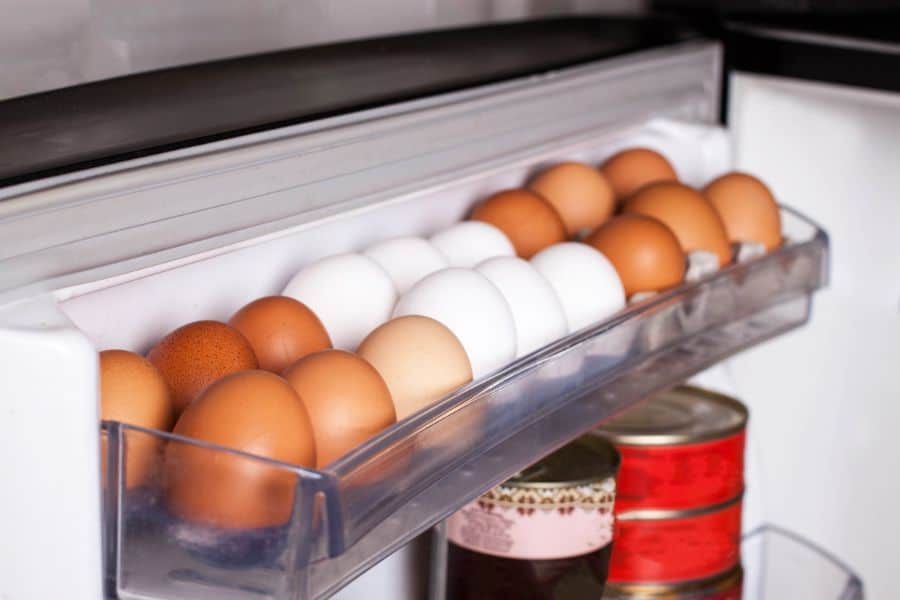Did you know that fresh unwashed eggs can be kept in the refrigerator for about 3 months or more without losing their quality?
When it comes to storing eggs, the main things to keep in mind are: are the eggs washed or unwashed, and are they refrigerated or unrefrigerated? This will help you decide how to store your eggs properly.
However, as a general rule, refrigerated fresh unwashed eggs outlast any other egg by a difference of weeks.
Fresh eggs are a nutritious and versatile food source, but proper storage is essential to maintain their quality, freshness, and safety.
Whether you’ve acquired farm-fresh eggs or simply want to optimize the storage of store-bought eggs, this article will provide you with comprehensive guidance on how to store fresh eggs for extended periods, both with and without refrigeration.
Read on to answer several questions: How long are fresh eggs good for? Do farm eggs need to be refrigerated? How to store fresh eggs without refrigeration? How long are fresh eggs good for in the refrigerator? How long are fresh eggs good for unrefrigerated? How long are unwashed eggs good for? – and more!
How Long Are Fresh Eggs Good For?
In poultry terms, fresh eggs are often used to refer to unwashed fresh eggs.
On average, unwashed eggs can remain good for approximately 2 to 3 weeks when stored at room temperature.
It is important to note that this assumes the eggs were clean, free from cracks, and collected relatively recently. It also assumes you stored the eggs in a cool and dry place, away from direct sunlight, strong odors, and heat sources.
Due to the temperature differences in a fridge, you can extend the protein decay period of your egg by lowering the temperature. Protein structure changes with time in organic matter, which is why every food goes bad and tastes different over time.
Under refrigeration, the fresh egg will last about 3 months (16 weeks) and more. This makes refrigeration the smartest choice to preserve eggs for longer.
Despite the benefits of refrigeration, sometimes not refrigerating the eggs might be the best move. For example, you can opt to freeze or pickle the eggs so that they last up to 4 months.
Below is a comparison table for how long different eggs last.
| Fresh unwashed eggs | Refrigerated: up to 3 months
Unrefrigerated: 2 -3 weeks |
| Fresh washed eggs | Refrigerated: 5 weeks
Unrefrigerated: 5 days |
| Frozen Eggs | Up to 4 months |
| Pickled Eggs | 3 – 4 months |
| Hard Boiled Eggs | Refrigerated: 7 days
Unrefrigerated: 2 hours |
| Cooked Eggs – scrambled, leftover whites or yolks, prepared dishes | Refrigerated: Less than 4 days
Unrefrigerated: 2 hours |
With that in mind, let’s take a look at why and how you should consider a refrigerator or not.
How To Store Fresh Eggs In The Refrigerator
First of all, do fresh eggs need to be refrigerated? No, they do not. You also don’t need to wash them.
In many countries, eggs are stored however the needs see fit. You will find farm-fresh unwashed eggs stored in fridges and as well at room temperature. The same goes for fresh-washed eggs.
For most people, eggs are rapidly cooked foods that do not stay on the shelves for long. The eggs usually do not end up sitting in the fridge, cabinet, or store for long. This makes it less important how eggs are better stored for longevity.
This is different in the States. According to the USDA guidelines, fresh commercially bought eggs need to be refrigerated immediately.
The recommended temperature is 40 degrees Fahrenheit or below. Since eggs freeze at 28 degrees F, having a low temperature of about 30 – 39 degrees F can extend their life from three to about 5 months.
USDA guidelines also help reduce the risks of Salmonella. Below are some conditions you should consider before refrigerating eggs:
Best Practices
1. Washed & Unwashed Fresh Eggs
It is best to immediately store fresh washed eggs in the refrigerator, whether commercially bought or farm-fetched.
That is because washed eggs are more porous and, therefore, can lose moisture and get contaminated with bacteria. This translates to a shorter lifespan outside the fridge.
Unwashed eggs, on the other hand, are to be refrigerated immediately. In fact, you can leave the eggs at room temperature for up 3 weeks without affecting their quality.
Unwashed eggs last longer because of a natural protective coating deposited by the hen onto the eggshells when they are laid.
The natural protective coating, or bloom, acts as a protective barrier against bacteria, moisture loss, and contamination. It helps seal the pores of the eggshell, preventing the entry of microorganisms and reducing the risk of bacterial growth.
Washed eggs lack the bloom’s protection, leaving them vulnerable.
Commercially bought eggs are washed in America. With this in mind, the USDA requires commercial eggs to undergo a process called pasteurization to help destroy contaminants that might enter through the eggshells.
Pasteurizing procedures are heat treatment methods that have to be approved by the United States and FDA. The method involves heating eggs in warm water baths without cooking them by using controllable temperatures and time.
2. Wrap The Eggs In Plastic Wraps or Use Cartons
A simple protective practice like placing fresh eggs in plastic wraps can extend the time in the fridge up to 2 months.
However, you should start small with just a carton or plastic egg carrier case.
Eggs can absorb odors from other foods in the refrigerator. By storing eggs in a carton, the likelihood of them absorbing unwanted smells is reduced, as the carton acts as a partial barrier.
Cartons also help in providing a consistent temperature around the egg while in the fridge. They are insulated, helping maintain stable and cooler eggs.
3. Keep Egg In A Shelf, Not On The Door
The refrigerator door is subject to temperature fluctuations due to frequent opening and closing, which can impact the eggs’ quality and freshness. To keep the egg fresher for longer, ensure you keep them on a shelf in the refrigerator.
4. Freese Extra Eggs for Extended Periods
Putting eggs in the freezer compartment is the best way to keep extra eggs for longer periods, up to 1 year. It is recommended you eat the eggs in the first 4 months since they will start to lose their freshness afterward.
Even though eggs can last up to a year in a frozen state, once you remove them, they only stay fresh for about 2 to 4 days.
5. Do Not Rely On Fridge To Keep Cooked Leftover Eggs
Cooked foods are best eaten in less than 2 days if refrigerated. The compound decay that takes after cooking is significant in reducing the lifespan by a big margin.
6. Store Pickled Eggs
Pickled eggs can stay fresh for more than 3 months. Pickling is an ancient method of preserving eggs that is simple to do.
First, hard boil the egg and peel the shells carefully. Proceed to put the warm-boiled eggs into clean canning jars and close them with a warm spiced vinegar solution.
Go on to close the jars with rings and lids before finishing the process by water bathing the jars for more than 10 minutes.
You can then proceed to put the jars in the fridge.
7. Use old eggs first
Ensure to keep track of which eggs went into the fridge first and which ones should come out first. It is best to avoid eating newly refrigerated eggs while leaving older and colder eggs in the fridge.
8. Previously Refrigerated Or Not
According to the USDA, “a cold egg left out at room temperature can sweat, facilitating the movement of bacteria into the egg and increasing the growth of bacteria.”
Keep refrigerated cold eggs in the fridge until you need to cook them. It is recommended to keep an egg out of the fridge for more than 2 hours.
Avoiding temperature fluctuations is key to maximizing the shelf life of already refrigerated eggs.
Step-by-Step Egg Refrigeration Process
Follow the following steps to refrigerate fresh eggs properly:
- Clean the eggs without water: If they are dirty, gently dry them with a soft cloth or brush. Avoid washing them with water, as it can remove the protective bloom.
- Refrigerate promptly: Place the eggs in the main body of the refrigerator, preferably on the middle or lower shelves. Use an egg carton or container: Keep the eggs in their original carton, or use a purpose-built container. This helps protect them from absorbing odors and prevents breakage.
- Handle eggs gently: Avoid dropping or jostling eggs, as rough handling can cause cracks and increase the risk of contamination.
- Avoid strong odors: Eggs are porous and can absorb odors from strong-smelling foods. Store them away from onions, garlic, and other pungent ingredients.
- Store separately from other foods: To prevent cross-contamination, it’s best to store eggs away from raw meat, fish, or any food with strong bacteria that may lead to foodborne illnesses.
How To Store Fresh Eggs Without Refrigeration
Even when stored unrefrigerated at room temperature, fresh unwashed eggs can remain good for a surprisingly long time.
The natural protective bloom on the eggs helps to inhibit bacterial growth and maintain their freshness. However, it’s important to note that unrefrigerated eggs have a shorter shelf life compared to refrigerated ones.
On average, unrefrigerated fresh eggs can remain good for 2 to 3 weeks. This timeframe assumes that the eggs were collected recently, are free from cracks, and have not been washed, which helps preserve the natural bloom.
Best Practices
If you prefer to store your fresh eggs without refrigeration, follow these steps to ensure their preservation:
- Gather fresh eggs: Start with eggs that are clean, free from cracks, and have been collected relatively recently.
- Leave the natural coating intact: Eggs have a protective coating called the bloom or cuticle, which acts as a barrier against bacteria. Avoid washing the eggs, as this removes the bloom and increases the risk of contamination.
- Store at room temperature: Find a cool and dry place with a temperature between 50°F and 70°F (10°C and 20°C) to store the eggs. The storage area should be away from direct sunlight, strong odors, and sources of heat.
- Arrange eggs properly: Place the eggs in a carton or an egg tray with the pointed ends facing downwards. This helps prevent the yolk from moving away from the center and maintains its position.
- Rotate eggs regularly: To ensure even distribution of the yolk and to prevent spoilage, gently rotate the eggs once a day.
- Check for freshness: Before using the eggs, perform the float test – Submerge the egg in a bowl of water; if it sinks to the bottom and lays flat, it is fresh. If it stands upright or floats, discard it, as it may not be safe to consume.
Also Read:
Fresh Eggs Storage: FAQs
Do I Need to Wash Fresh Eggs Before Cracking Them?
You should only wash eggs before cracking if the shell is covered in poop, mud, and other germ-infested coverings. If you crack an unwashed egg, you may risk transmitting germs from the egg to your meal.
Apart from cleaning the germs, you do not need to wash eggs. That is because unwashed eggs last for longer in and out of the fridge than washed eggs. Hold on to the dirty eggs until right before you use them.
How to Wash Fresh Eggs?
Washing an egg is simple, but you need to be cautious not to poke the small pores on the eggs. The pores, when cracked, allow harmful bacteria to enter the whites and yolks, thereby spreading germs and causing the egg to go bad.
Wash the eggs by simply rinsing and rubbing them under plain tap water(preferably cool) and making sure you do not poke the shells. Soaps and detergents are not needed.
Summary
In summary, the best way to store fresh eggs (for longer frequent consumption) is through the following steps:
- Do not wash eggs immediately; only when you want to cook them.
- Put the unwashed fresh eggs in cartons or covers and then place them in the refrigerator.
- Avoid storing them in fridge door compartments as the temperature fluctuates more there.
- Keep track of which eggs went into the fridge first so as to cook older & colder eggs before newer ones.
- Keep refrigerated eggs in the fridge. If removed outside for a while, ensure they are not left at room temperature for more than 2 hours.
Follow this strategy, and you will store your fresh eggs for the longest time without sacrificing their quality!



